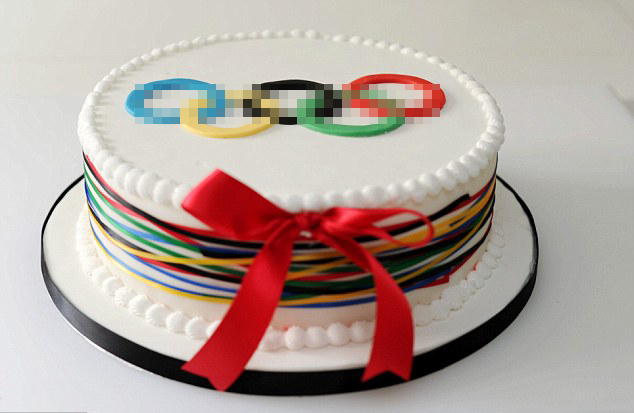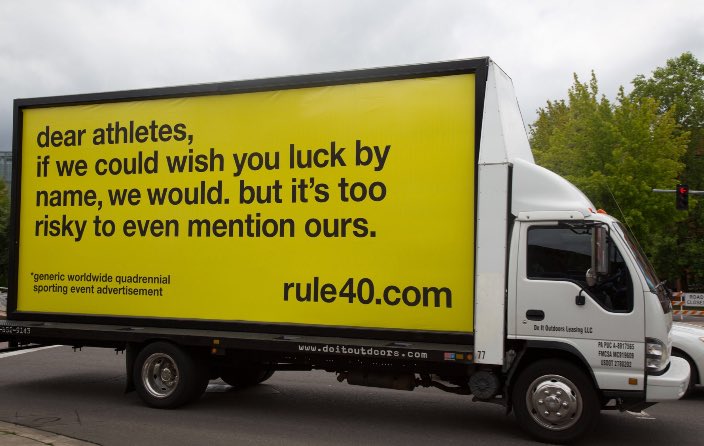
Rule 40 at work – We are excited to be suppliers to [REDACTED] and [REDACTED] who will be competing in the [REDACTED] this year. We are also incredibly proud to supply the duo [REDACTED] and [REDACTED] in the [REDACTED] at the Paralympics Games. If only we could tell you about them!
In an impressive bit of viral marketing this week, Brooks Sportswear managed to take the International Olympic Committees restrictive rule 40 , which effectively bans companies from even acknowledging the athletes they support and sponsor, and turned it on its head.
Not only have they helped to highlight how unfair this legislation can be and bring it to the attention of the wider public, but bring huge media interest to their company at the same time.
So what is Rule 40, what does it mean for athletes, and why are people getting so upset about it?

“Except as permitted by the IOC Executive Board, no competitor, coach, trainer or official who participates in the Olympic Games may allow his person, name, picture or sports performances to be used for advertising purposes during the Olympic Games.”
Essentially, unless you have paid untold millions to the IOC, you cannot use an athlete you sponsor in any form of marketing. It doesn’t matter if you have sponsored an athlete for years, if a company even tweets their athlete a good luck message before an event, that athlete can face strict sanctions all the way up to not being allowed to compete or having medals taken away.
Well what’s the problem? Every four years we seem to hear a lot of the same criticisms of the Olympic Games. You hear people talking about how over commercialised it has become, how we should take the games back to a time when it was about outstanding achievements by amateurs. Perhaps stripping corporate sponsorship out of athletic achievement is exactly what we need?
The IOC seem to hide behind this sentiment, claiming that Rule 40 was designed to prevent over commercialisation, stop ‘ambush marketing’ and preserve Olympic funding. But the reality is it does the opposite.
The truth is, the vast majority of athletes competing this year are amateurs. Of the ten and a half thousand athletes competing, I challenge you to name more than twenty or thirty. I definitely can’t.
Many of the athletes competing this year wouldn’t be considered professional even if they do have sponsors due to the fact that outside of an Olympic year, they work regular jobs to pay the bills.
The Olympics is the one opportunity every four years to raise the profile of their sport and to perhaps grow interest enough that it could become a full time profession. With the strict rules on communicating with, or being promoted by their sponsors, those competing in niche sports miss the biggest opportunity of their sporting career for self promotion.
The five or six official sponsors and partners of the Olympics know what’s popular, and that is what they are going to focus on. Michael Phelps, Usain Bolt, and the other select superstars in the most popular events are promoted for all their worth to sell the big sponsors products, while everyone else is sidelined.
What about Judo? or Rhythmic gymnastics? or double trap shooting? I watched all of these sports last time around and enjoyed myself, but in all honesty they weren’t the sports I was excited about. By the same token, I’m sure a Judo fan somewhere was watching the triathlon but hasn’t thought much about it since.
You can’t blame the sponsors for this. They have spent tens of millions and need to get absolutely the most bang for their buck as they possibly can. But if the only legal promotion is for a handful of superstars, it doesn’t leave many opportunities for the 20 meter air rifle shooters, the canoeists, or any of the other ten and a half thousand athletes representing their countries by doing the sports they love.
The audience for the niche sports will never be as big as the 100 meter sprinters, but this doesn’t mean people don’t enjoy these sports. Many millions are training and competing in them for pleasure every day, and those who have managed to reach the top of their discipline deserve to be rewarded for their hard work and dedication.
For every niche sport, there is an army of enthusiasts, and out of them grow countless companies who support their growth by producing new equipment, publishing magazines, running training camps or even providing bicycle insurance (wink, wink).
Where athletes in these sports become influencers in their field as a result of their achievements, companies want to support and promote them. Not just as a way of telling interested people about their product, but because they are passionate about their sport. And if one of these athletes manages to reach such a high level that they qualify for the Olympic Games, imagine the pride these companies must feel to have this athlete as a brand ambassador. If only they were allowed to talk about it.
The real question, is why are the IOC so doggedly following this legislation?
One of the key arguments of rule 40 for the IOC is the need to preserve Olympic funding. They argue if the sponsorship deals made by companies like Coca-Cola and MacDonald’s are eroded by this ‘ambush marketing’, this will have knock on effect on the athletes.
Are brands like Coke and McDonalds really going to see tiny companies sending good luck tweets and thumbs up emojis to athletes, and decide that is a more effective way of marketing their product than plastering stadiums with their logos? Does a local bakery painting Olympic rings on their iced fingers really constitute a bigger threat to the IOC than recent bribery and drugs scandals?
The tragedy of the situation is the IOC doesn’t have a leg to stand on legally. If a company were to ignore the rule and continue to promote their sponsored athlete throughout the Olympics, there are no sanctions that can be brought against the company. They aren’t using Olympic intellectual property after all. What the IOC can do however, is pass the punishment on to the athlete in question. The fact that small companies are so frightened of breaking the rules just goes to prove how much they care about the sport.
The rules enforced by the IOC only help to earn revenue for the IOC, a handful of big businesses and a small selection of athletic superstars. The ten thousand other athletes are forbidden from even receiving a good luck tweet. It’s about time things changed.